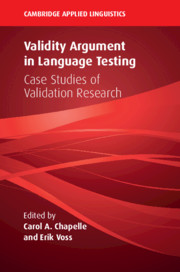Book contents
- Validity Argument in Language Testing
- The Cambridge Applied Linguistics Series
- Validity Argument in Language Testing
- Copyright page
- Contents
- Figures
- Tables
- Contributors
- Series Editor’s Preface
- 1 Introduction to Validity Argument in Language Testing and Assessment
- Part I Basic Concepts and Uses of Validity Argument in Language Testing and Assessment
- Part II Investigating Score Interpretations
- Part III Investigating Score Uses and Consequences
- Part IV Conclusion
- Index
- References
1 - Introduction to Validity Argument in Language Testing and Assessment
Published online by Cambridge University Press: 14 January 2021
- Validity Argument in Language Testing
- The Cambridge Applied Linguistics Series
- Validity Argument in Language Testing
- Copyright page
- Contents
- Figures
- Tables
- Contributors
- Series Editor’s Preface
- 1 Introduction to Validity Argument in Language Testing and Assessment
- Part I Basic Concepts and Uses of Validity Argument in Language Testing and Assessment
- Part II Investigating Score Interpretations
- Part III Investigating Score Uses and Consequences
- Part IV Conclusion
- Index
- References
Summary
Validity Argument in Language Testing: Case Studies of Validation Research introduces argument-based validation and illustrates how the framework is used to conceptualize, design, implement, and interpret validation research for language tests and assessments. The first section introduces the principal concepts and key terms required to understand argument-based validity in language testing, and it identifies argument-based validation studies in language testing. The second section contains chapters reporting argument-based validity research to investigate score interpretation in six language assessments by conducting research on such issues as the reliability of scores, rating quality, the constructs assessed, and the abilities required in the domain of interest. The third part contains three chapters reporting studies of test score use, including their consequences. By presenting each of these studies with reference to a consistent, but customizable, framework for test interpretation and use, the chapters show the contribution of multiple types of investigations and the use of mixed methods research. The volume demonstrates the importance of argument-based validation of assessments for varying purposes and at different stages of test development, for technology-mediated language assessment, and for clarifying constructs definition. It also notes the limits of argument-based validity.
- Type
- Chapter
- Information
- Validity Argument in Language TestingCase Studies of Validation Research, pp. 1 - 16Publisher: Cambridge University PressPrint publication year: 2021

